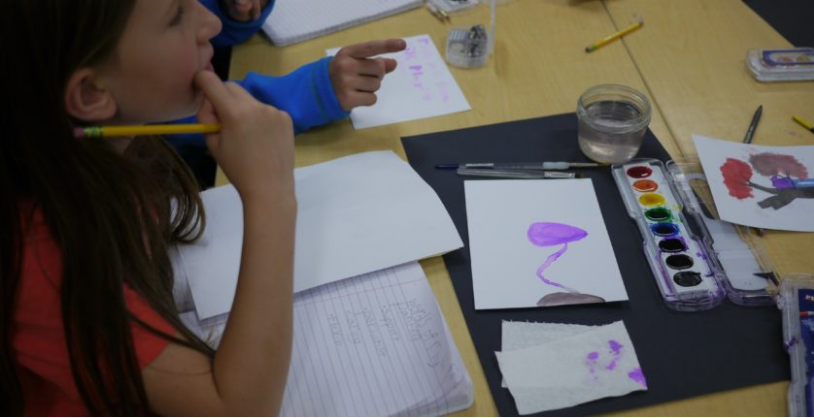A response to the “Governing Cancer of Our Time”

Our focus for this year’s Summer Symposium is Play, the Arts, and Education for Democracy. Setting that theme guides our attention throughout the year. How might play and the arts support education for democracy? What might that look like when working with young people in Portland in 2016?
When we turn our attention away from the classroom as we come to the end of this election cycle, democracy appears to be in crisis. As David Brooks wrote earlier this year, we’re in a moment of “antipolitics.” “We’re now at a point in which normal political conversation has broken down,” Brooks wrote. “People feel unheard, which makes them shout even louder, which further destroys conversation.”
Our work with children can point to something better – can suggest an antidote to the “governing cancer of our time.” Stepping into Opal 4 earlier this week, I listened to nine- and ten-year-olds talk about paintings they did responding to the question, “What do you value about having a community where it’s safe to risk?”
The list of values was extensive: growth; determination; togetherness; flexibility; being brave; breaking barriers; teamwork; encouragement; belongingness; welcome; comfort; love; joy; just do it; stepping up; feelings are ok; friendships; someone to help you back from the danger zone; curiosity; collaboration; support; imagination.
At the end of the conversation, Nate’s statement about his painting seemed especially hopeful in seeing a way beyond our political moment. He said,
“Hannah used to always tell us how much she appreciated it when we brought up different ideas in our meetings. I love the idea that when two people argue they can come up with a bigger solution than they ever could have alone.”
I wonder:
How are you inviting conflict into your classrooms ways that lead to bigger solutions?
How are you finding play and the arts supportive to constructing education for democracy?

Thank you for this beautiful post, Matt. This makes me think of a recent article by the Dalai Lama that shows what happens when people feel unneeded as well as unheard – emphasizing that we actually feel better and are more connected when we are helping others or in service and support of others: http://www.nytimes.com/2016/11/04/opinion/dalai-lama-behind-our-anxiety-the-fear-of-being-unneeded.html?_r=0